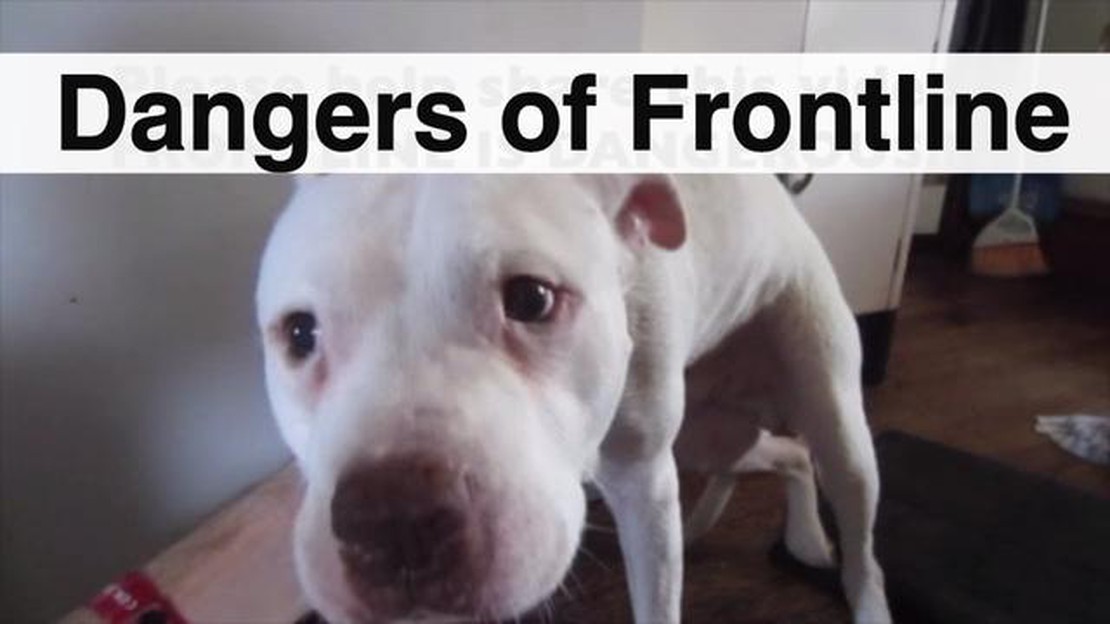What Is Leland Chapman Doing Now: Latest Updates on His Life and Career
What Is Leland Chapman Doing Now Leland Chapman, best known for his role on the reality TV series “Dog the Bounty Hunter,” has been keeping busy with …
Read Article
In today’s world, pet ownership is more popular than ever. Many people consider their pets to be part of their family and take great care to ensure their well-being. One of the most important aspects of pet care is protecting them from fleas and ticks. Frontline is a popular brand of flea and tick prevention products for pets, but many pet owners wonder if it is safe for humans to touch.
Frontline contains active ingredients that are toxic to fleas and ticks, but are they harmful to humans? The answer is, in general, no. Frontline is designed to be safe for both pets and humans when applied correctly. However, it is important to follow the instructions provided by the manufacturer to minimize any potential risk.
It is important to note that while Frontline is generally safe for humans to touch, it is not meant to be ingested. This means that you should avoid touching your mouth or eyes after applying Frontline to your pet. If accidental ingestion does occur, it is recommended to seek medical attention immediately.
It is also worth mentioning that some individuals may have sensitivities or allergies to the ingredients in Frontline. If you or someone in your household experiences any adverse reactions after handling Frontline, such as skin irritation or difficulty breathing, it is important to discontinue use and consult a healthcare professional.
Frontline is widely recognized as one of the most effective flea and tick treatments available for pets. Its active ingredient, fipronil, is a powerful insecticide that targets fleas, ticks, and other parasites. The effectiveness of Frontline can be attributed to various factors:
It is important to note that while Frontline is highly effective, it is essential to follow the instructions provided by the manufacturer. This includes the correct dosage for your pet’s weight and the recommended frequency of application. By using Frontline as directed, you can ensure optimal effectiveness and protection against fleas and ticks.
Read Also: Old Dog Running Around Erratically: Understanding the Causes and How to Help
While Frontline is considered safe for pets when used correctly, it is important for humans to take certain precautions when handling the product. Here are some safety measures that should be followed:
By following these safety precautions, you can minimize any potential risks associated with handling Frontline and ensure the well-being of both your pet and yourself.
While Frontline is commonly used to protect pets from fleas and ticks, it is important to be aware of the potential risks associated with its use. Here are some potential risks that pet owners should consider:
While the risks associated with Frontline are generally low, it is important to use the product as directed and to be aware of any potential side effects. If you have any concerns or questions about using Frontline, it is best to consult with a veterinarian.
Read Also: Is Mashed Potatoes Good For Dogs? Find Out Here!
Frontline is generally considered safe for humans to touch. It is specifically formulated for the treatment and prevention of fleas and ticks in dogs and cats. However, it is always recommended to wash your hands thoroughly after applying it and avoid touching your eyes or mouth before doing so. If any adverse reactions occur, it is advised to seek medical attention.
Although Frontline is generally safe for humans, some people may experience skin irritation or allergic reactions if they come into direct contact with the product. Symptoms may include redness, itching, rash, or swelling. In case of any adverse reactions, it is important to immediately wash the affected area with soap and water and seek medical attention if necessary.
Frontline is generally safe for pets and humans, but it is important to keep it out of reach of children and avoid accidental ingestion or contact. If a child accidentally touches Frontline, it is recommended to immediately wash the affected area with soap and water. However, if any signs of irritation or adverse reactions occur, it is best to consult a doctor for further guidance.
When applying Frontline to your pet, it is important to follow the instructions provided by the manufacturer. Wear gloves to protect your hands and avoid direct contact with the product. Make sure to apply Frontline in a well-ventilated area to minimize exposure to the fumes. After application, wash your hands thoroughly with soap and water. If you have any concerns or questions, consult your veterinarian.
What Is Leland Chapman Doing Now Leland Chapman, best known for his role on the reality TV series “Dog the Bounty Hunter,” has been keeping busy with …
Read ArticleAre Aphids Harmful To Dogs Aphids are small insects that are commonly found on plants and flowers. They are known for their ability to reproduce …
Read ArticleHow Long Does Hge In Dogs Last Hemorrhagic Gastroenteritis (HGE) is a severe gastrointestinal condition that affects dogs. It is characterized by …
Read ArticleSeeing A Black Dog Spiritual Meaning Throughout history, animals have been seen as messengers in various spiritual traditions. In particular, black …
Read ArticleCost Of Thyroid Test For Dogs If you suspect that your furry friend might be experiencing thyroid issues, it’s important to get them tested as soon as …
Read ArticleDog Walking After Stroke Are you or a loved one recovering from a stroke and struggling with mobility? Do you miss the independence that walking used …
Read Article